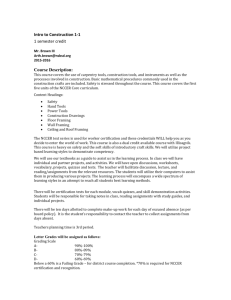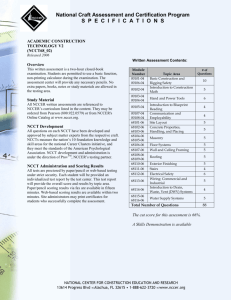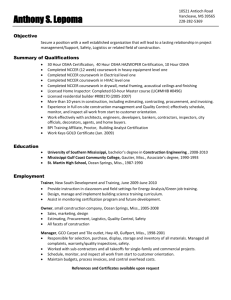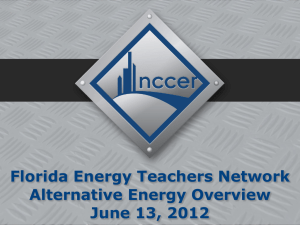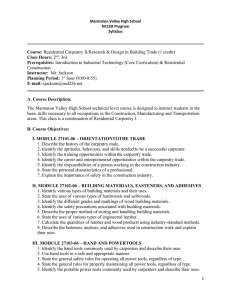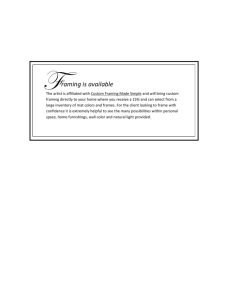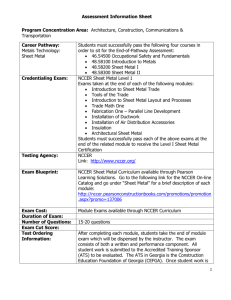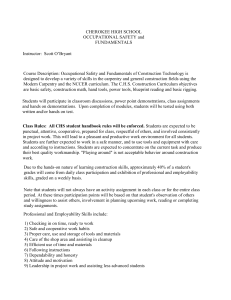NCCER Sample Syllabus - alskillsusa.org
advertisement
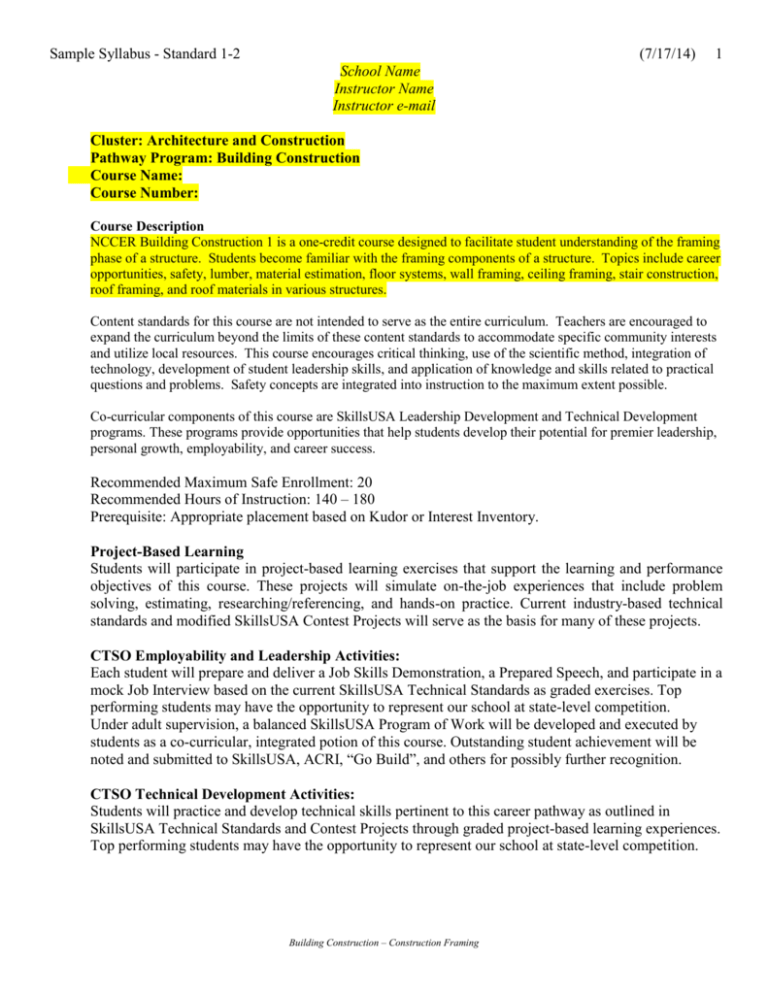
Sample Syllabus - Standard 1-2 (7/17/14) 1 School Name Instructor Name Instructor e-mail Cluster: Architecture and Construction Pathway Program: Building Construction Course Name: Course Number: Course Description NCCER Building Construction 1 is a one-credit course designed to facilitate student understanding of the framing phase of a structure. Students become familiar with the framing components of a structure. Topics include career opportunities, safety, lumber, material estimation, floor systems, wall framing, ceiling framing, stair construction, roof framing, and roof materials in various structures. Content standards for this course are not intended to serve as the entire curriculum. Teachers are encouraged to expand the curriculum beyond the limits of these content standards to accommodate specific community interests and utilize local resources. This course encourages critical thinking, use of the scientific method, integration of technology, development of student leadership skills, and application of knowledge and skills related to practical questions and problems. Safety concepts are integrated into instruction to the maximum extent possible. Co-curricular components of this course are SkillsUSA Leadership Development and Technical Development programs. These programs provide opportunities that help students develop their potential for premier leadership, personal growth, employability, and career success. Recommended Maximum Safe Enrollment: 20 Recommended Hours of Instruction: 140 – 180 Prerequisite: Appropriate placement based on Kudor or Interest Inventory. Project-Based Learning Students will participate in project-based learning exercises that support the learning and performance objectives of this course. These projects will simulate on-the-job experiences that include problem solving, estimating, researching/referencing, and hands-on practice. Current industry-based technical standards and modified SkillsUSA Contest Projects will serve as the basis for many of these projects. CTSO Employability and Leadership Activities: Each student will prepare and deliver a Job Skills Demonstration, a Prepared Speech, and participate in a mock Job Interview based on the current SkillsUSA Technical Standards as graded exercises. Top performing students may have the opportunity to represent our school at state-level competition. Under adult supervision, a balanced SkillsUSA Program of Work will be developed and executed by students as a co-curricular, integrated potion of this course. Outstanding student achievement will be noted and submitted to SkillsUSA, ACRI, “Go Build”, and others for possibly further recognition. CTSO Technical Development Activities: Students will practice and develop technical skills pertinent to this career pathway as outlined in SkillsUSA Technical Standards and Contest Projects through graded project-based learning experiences. Top performing students may have the opportunity to represent our school at state-level competition. Building Construction – Construction Framing Sample Syllabus - Standard 1-2 (7/17/14) 2 Student Credentials: Students who successfully complete each module written assessment with a score of 70% or higher and pass the performance evaluation to NCCER Standards will have the opportunity to earn the NCCER module credential for each module completed. College Credit Articulation: There is no state-wide articulation in place at this time. Explain any local articulation agreements you may have with your Postsecondary partner. Industry Credit and/or Articulation: The credentials earned in this course are recognized by all NCCER member contractors and trade associations. Students are urged to print copies of their NCCER transcript, accessible on-line through the NCCER National Registry, and make it available to potential employers and/or organizations that will provide additional craft education training and/or apprenticeships. Course Outline with Training Goals & Objectives – Insert whole page from Download here------Find your courses Download at http://alskillsusa.org/pb/wp_d6f1c587/wp_d6f1c587.html “NCCER Courses 2014” Instructional Philosophy Students will be expected to meet all course goals and be able to demonstrate their understanding of the basic concepts. Instruction will be primarily laboratory related. Students will experience theoretical and practical aspects of the subject. The course requires the student to use decision-making and critical thinking skills and to complete assignments. Assignments will require students to use academic skills in mathematics and language arts. Student assessment will be based on individual completion of assignments, projects, presentations, and test of concepts taught during the course. Students will have to refer to the local business and industry contacts to obtain information for some course assignments. Library research will be required for some projects. Students will learn how to self-evaluate their progress and be expected to make adjustments as needed throughout the course. Individualized assistance will be provided to students who are performing poorly. An action plan will be developed with the student to guide and clarify further behavior, progress performance expectations. Culminating Product Students who meet all the requirements will earn NCCER module credentials, demonstrate mastery of mathematics commonly used in the construction trades, and exhibit strong employability skills. Essential Question Has the student developed the competencies necessary to transition into employment, apprenticeship and or further education? Assessment Procedures Grades for school reporting purposes are based on the first attempt at the written test and performance tests. Final grades will be derived from classroom and lab activities. Building Construction – Construction Framing Sample Syllabus - Standard 1-2 (7/17/14) 3 NCCER Credentialing is only earned by achieving a 70% or higher score on each NCCER written test and passing the corresponding NCCER Performance Evaluation. Retesting is guided by NCCER policy. All students will prepare and deliver demonstrations and presentations based on the Technical Standards outlined for SkillsUSA Job Skills Demonstration A, Job Interview, and Prepared Speech. Instructional Delivery Plan After a short review, the teacher introduces the class to any new information and what to expect in the lab and classroom that period. The teacher will then discuss and demonstrate any safety procedures to the students. Students may be required to generate Job Safety Analysis sheets or complete safety tests specific to the equipment being used for that unit. Next the teacher will go over how students will be assessed in the lab and classroom for that unit or project. Industry partners and advisory committee professionals may assist the instructor with course delivery and assessment. Grading Scale A student‘s final grade for LEA reporting will be based on the following levels of performance: Performance Standards Grade A - Independent Learner, Managed time wisely; needed some help from teacher; applied academic skills; evaluated work and made adjustments; sought and found resources independently; demonstrated knowledge with a grade of 90% or higher. Grade B – Semi-independent learner, managed time wisely; needed some help from teacher to complete assignments and find errors; did quality work with few flaws; demonstrated knowledge with a grade of 80% or higher. Grade C – Dependent learner, needed help to manage time wisely; relied a great deal on help from teacher to complete assignments and find errors; needed help to evaluate projects; with corrections, the final products met standards; demonstrated knowledge with a grade of 70% or higher. Grade D – Unsatisfactory, did not complete many assignments; finished products are of low quality; failed to meet standards; lack of effort; demonstrated knowledge with a grade of 60% or higher. Grade F – Failure, did not complete any assignments; finished products are of such low quality that they did not pass; no effort put forth towards work; demonstrated knowledge with a grade of 50% or less. Employability and Professional Development Behavioral Indicators In conjunction with the teacher, students will participate in self-assessment exercises that will describe and measure employability behaviors. Professional improvement plans will be developed, practiced, and assessed. SkillsUSA professional development materials may also be utilized. Math, Science, and Reading in the Content Area: Students will be expected to demonstrate math and reading competencies at levels commensurate with their grade level. A diagnostic math assessment will be given at the beginning of the semester to determine student readiness. Coursework will include graded exercises and projects that require such competencies. Building Construction – Construction Framing Sample Syllabus - Standard 1-2 (7/17/14) 4 Committee Identified Academic Skills The national technical committee has identified that the following academic skills are embedded in this training program and related assessments: Source: NCTM Principles and Standards for School Mathematics. To view high school standards, visit: standards.nctm.org/document/chapter7/index.htm. Select “Standards” from menu. Source: McREL compendium of national science standards. To view and search the compendium, visit: www.mcrel.org/standards-benchmarks/. Identified Math Skills • Use fractions to solve practical problems • Convert fractions to decimal equivalents including measurement conversions • Convert decimals to fractional equivalents including measurement conversions • Accurately measure, interpret measurements, and perform tasks to specified measurements • Measure and interpret angles • Use proportions and ratios to solve technical problems • Develop and interpret three-dimensional models • Construct three-dimensional models • Use algebra to solve equations • Use right-angle trigonometric rules to solve technical problems • Use trigonometric functions to solve technical problems Identified Science Skills • Describe and recognize the properties of solids, liquids and gases • Use knowledge of principles of electricity and magnetism Language Arts Skills • Provide information in conversations, in group discussions, and in oral presentations • Demonstrate effective listening skills by following instructions, note taking, and procedure writing • Demonstrate use of verbal communication skills, such as word choice, pitch, feeling, tone and voice • Demonstrate use of nonverbal communication skills: eye contact, posture, and gestures using interviewing / questioning techniques to gain information • Demonstrate comprehension of a variety of informational texts • Understand source, viewpoint and purpose of texts • Demonstrate knowledge and use of appropriate reference materials • Use print, electronic databases, and online resources to access information in books and articles • Demonstrate informational and technical writing • Edit writing for correct grammar, capitalization, punctuation, spelling, sentence structure and paragraphing Building Construction – Construction Framing Sample Syllabus - Standard 1-2 (7/17/14) 5 Course Guidelines Safety Guidelines All Students will take a comprehensive written safety test and pass it with 100% accuracy, before any lab work can take place. This test will be given within the first two weeks of school. All school system drug and substance abuse policies will be enforced to their fullest extent. 1. All students will wear safety glasses while in the lab area. 2. Earplugs will be used when necessary, this means if a student has to talk above his or her normal voice when grinding or using hammers, earplugs are required. 3. Face shields will be required for all grinding tasks. No exceptions. 4. At a minimum, students are required to have 100% cotton long-sleeved shirts if welding or burning. 5. Work gloves will be used while the student is in the lab. Please keep in mind, gloves are not required while using a drill or other rotating hand tools or equipment. 6. Horseplay and harassment of any kind will not be tolerated. 7. Sturdy leather work shoes/boots are required while in the lab. Steel-toe shoes/boots are preferred. Lab Rules 1. All students will meet in the classroom each day for roll call, once roll has been taken, the students may be dismissed to the lab. 2. Students should only take 5-8 minutes to dress out and be in their work area. 3. Students may be assigned a work area in the lab, and a desk in the classroom. Students will only use his or her assigned area or classroom desk. 4. Any student, who arrives after the tardy bell, will be required to have a late arrival slip before entering class. 5. No student will be allowed to leave class before the bell rings, nor linger outside the shop doors. 6. No student will be allowed outside the shop unless he or she has permission from the instructor. 7. Students will have 5-8 minutes at the end of each block/period to clean up and dress-out before the bell rings. 8. Each student will be responsible for the cleaning and upkeep of his or her work area. Building Construction – Construction Framing Sample Syllabus - Standard 1-2 (7/17/14) 6 Classroom Rules 1. Students must raise their hand to be recognized. 2. Students requesting to go to the restroom, need only raise their hand to be excused. 3. Students will stay in their assigned seat until class is over. 4. No student will be allowed to sleep in class. 5. No student will toss or throw items in the classroom or lab. 6. No student will sit on top of any desk. 7. Students will not write on the dry erase board without permission from the instructor. 8. Students will not write in their assigned books. 9. Students will not write on any written test, unless the instructor gives prior permission. All tests must be turned returned to the instructor. No tests will leave the classroom. Answer sheets will be distributed for students use and record keeping. 10. No student will put his or her feet on a desk or walls for any reason. 11. All student information required on the answer sheet must be filled out properly. 12. Any student filling out paper work will be required to print the information legibly, if not, 10 points will be taken off the students test. 13. Female students will be allowed to use main building restrooms. 14. Students will not leave throwaway items at his or her desk, i.e., paper, drink bottles, paper wrappers, etc. __________________________________________________________________________________________ I have read and understand the expectations and rules pertaining to my participation in this elective. Student Name: _______________________________________ Student Signature: ____________________________________ Date: ____________________ Parent or Guardian Name:_______________________________ Parent or Guardian Signature:____________________________ Date: ____________________ Address:____________________________________________________________________________ Daytime Phone # ________________________ E-mail _________________________________ Evening Phone # ________________________ Building Construction – Construction Framing Sample Syllabus - Standard 1-2 (7/17/14) Attached: Course Fees Information Course Sequence for this Career Pathway NCCER Overview and Information NCCER Registration and Release Form SkillsUSA Information Building Construction – Construction Framing 7
